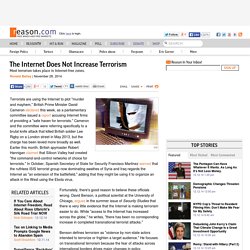

TCP-Multidiciplinary Conference on Cyberterrorism 2013 - Report. .pdf. Emerging Cyber Threats Report 2014 - GTISC and GTRI. .pdf. Cyberterrorism in the context of globalization - Informatics and law - 2002. .pdf. Terrorism in Cyberspace Myth or Reality - SS 2007. .pdf. BPladna_Cyber Terrorism and Information Security. .pdf. Jihadist Terrorism and Other Unconventional Threats - BPC 2014. .pdf. Approach ISIS tweets with caution - "It's clear that that they've gotten some pretty sophisticated media strategists and social media tacticians on their team"
Posted on Thursday Nov 20th at 11:45am By Jared Malsin CAIRO--When it seized huge parts of Syria and Iraq this year, the self-proclaimed Islamic State--and the geopolitical chaos surrounding it--became one of the biggest news stories on the planet.

But journalists have little means of directly reporting on the group, its activities on the ground, or the havoc it has sown in the region. A physical meeting with the group's members could mean a death sentence; this is an organization notorious for kidnapping and murdering journalists, both foreign and local. Before ISIS was even created, a wave of kidnappings of journalists had already made much of Syria off-limits for reporters. ISIS and its supporters produce a vast quantity of tweets and other material, much of it in English. The torrent of tweets, memes, and videos can't be simply ignored.
There are other ways for journalists to report on ISIS, but they are expensive, time consuming, and often unglamorous. ISIS Using Bitcoins to Fund Criminal Activities. The Islamic State of Iraq and Syria (ISIS) has been called the world’s richest terror group.

While the group generates the majority of its funds through oil fields seized in northern Iraq and Syria, it still relies on a number of other ways to secure financing. Donations from wealthy sympathizers greatly helped ISIS when it was first established. However, now that global governments are aware of ISIS and actively look to track and block all funding efforts through banking channels, donations have become harder to receive. These difficulties have not stopped ISIS from seeking ways to bypass sanctions and money-laundering filters, however. The group has begun to use cryptocurrencies such as Bitcoins as it looks for anonymous and untraceable ways to transfer money. Russia Step Ups Censorship of ISIS Social Media Content. Russia's new efforts to search for and delete ISIS social media content.

Images edited by Kevin Rothrock. Its territorial gains over the past year have astounded the world, but some of the most surprising successes for ISIS have come in cyberspace, where the group's social media presence is booming. Using Twitter, Instagram, and YouTube, as well as various Internet memes, ISIS releases videos and images, often featuring violent scenes of beheadings and torture against Iraqis and Syrians. Supporters and various twisted Internet users are quick to upload and disseminate this content all around the world. Los gigantes se reunen para combatir a ISIS y la vigilancia de los gobiernos.
Las redes sociales Facebook y Twitter, el mastodonte de Internet Google y otras tecnológicas como Microsoft se reunieron en Luxemburgo con altos cargos de la Unión Europea para discutir sobre el avance de la propaganda del terrorismo fundamentalista online y sobre posibles formas de frenarlo.

Así lo publica la BBC, a la cena a la que acudieron representantes de ambas partes. Military Cyber Defense Structures of NATO Members - An Overview. .pdf. El ciberterrorismo, en continuo crecimiento. El ciberterrorismo es una actividad "en continuo crecimiento", lo que la convierte en una amenaza constante contra la que de momento no se dispone de los suficientes recursos, según se indicó en la sesión de clausura de la X Conferencia Internacional sobre Ciberterrorismo.

Los expertos reunidos en este foro, que se ha celebrado en la localidad austríaca de Baden, incidieron en la necesidad de que las sociedades, los gobiernos y los organismos de seguridad activen nuevos y más eficaces mecanismos para afrontar la amenaza ciberterrorista, que suele concluir en una acción de tipo terrorista convencional, cuya pista de lanzamiento es la propia red. El jefe de los espías británicos pide ayuda a Facebook y Twitter. LONDRES, 4 (Reuters/EP) Twitter y Facebook son tan importantes para los grupos radicales y terroristas que los gigantes tecnológicos estadounidenses deberían dar un mayor acceso a los servicios de seguridad para permitir que los gobiernos occidentales puedan evitar ataques, ha defendido el nuevo director del Cuartel General de Comunicaciones (GCHQ, uno de los servicios de inteligencia británicos), Robert Hannigan.

Cada vez más gobiernos usan Facebook para procesar a criminales - BBC Mundo. ¿Qué pasa cuando una ciudad es hackeada por completo? - BBC Mundo - Noticias. CybeerSecurlty. CyberSecurity - #Seguridad & #TICs. Ciberciudadanos_Netizens. Self Defense - Seguridad Personal. The Internet Does Not Increase Terrorism. DWTerrorists are using the Internet to plot "murder and mayhem," British Prime Minister David Cameron declared this week, as a parliamentary committee issued a report accusing Internet firms of providing a "safe haven for terrorists.

" Cameron and the committee were referring specifically to a brutal knife attack that killed British soldier Lee Rigby on a London street in May 2013, but the charge has been levied more broadly as well. Earlier this month, British spymaster Robert Hannigan claimed that Silicon Valley had created "the command-and-control networks of choice for terrorists. " In October, Spanish Secretary of State for Security Francisco Martinez warned that the ruthless ISIS terrorist group now dominating swathes of Syria and Iraq regards the Internet as "an extension of the battlefield," adding that they might be using it to organize an attack in the West using the Ebola virus. Fortunately, there's good reason to believe these officials wrong.